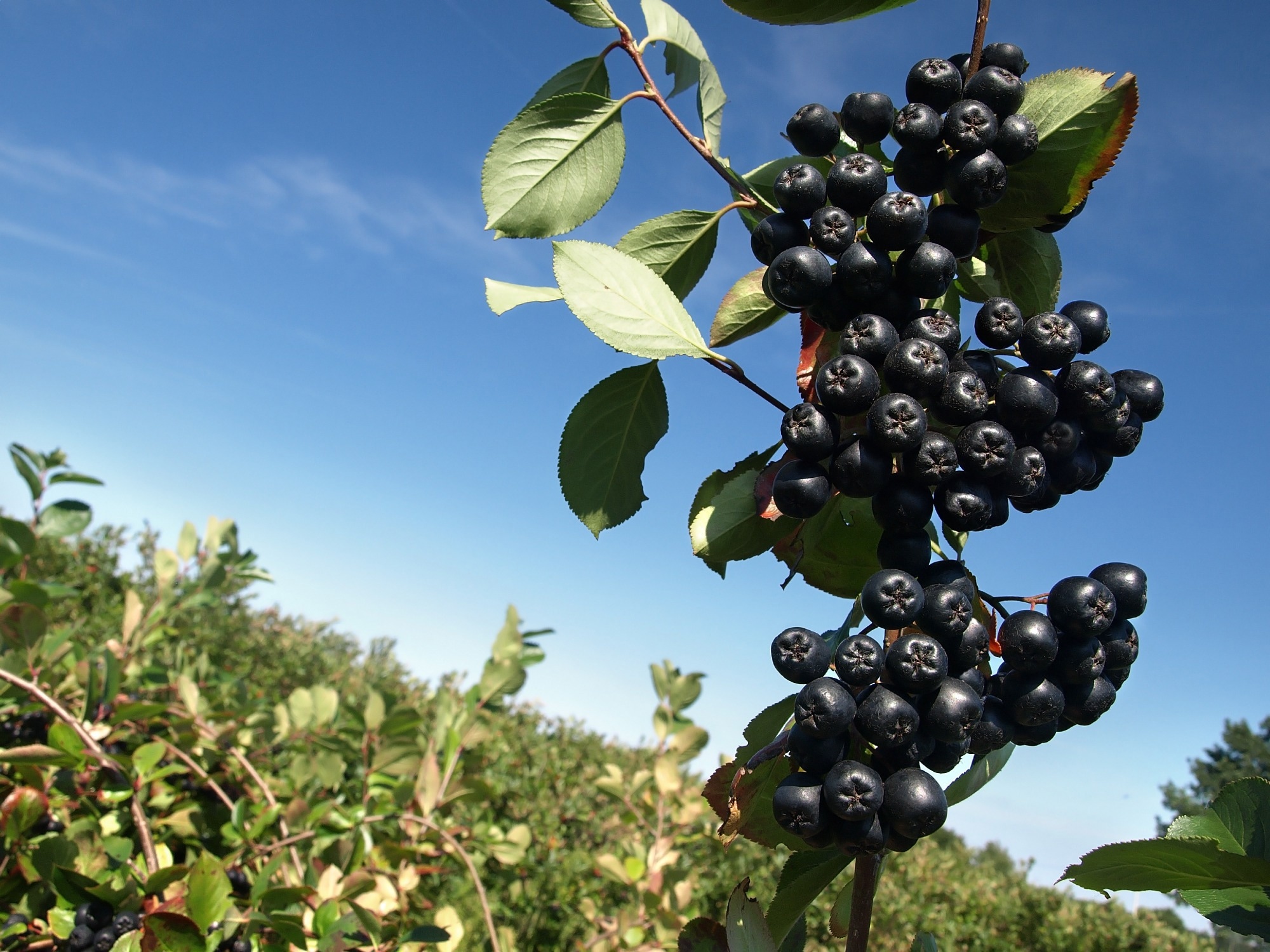In a recent review published in the journal Food Science and Human Wellness, researchers collated current research on the disease control and prevention potential of Aronia melanocarpa, the black chokeberry. They summarize and present critical black chokeberry metabolites, their respective anti-disease (prevention, adjuvant, and therapeutic) properties, and the diverse mechanisms of action that these functional components exert on the human body.
Study: Polyphenol components in black chokeberry (Aronia melanocarpa) as clinically proven diseases control factors—an overview. Image Credit: emberiza / Shutterstock
The history of black chokeberry in medicine
Aronia melanocarpa, colloquially known as the black chokeberry, is a branching shrub species native to eastern North America. It belongs to the family Rosaceae and can be identified by its glossy dark green leaves that turn red in autumn. Following investigations into its health benefits, black chokeberry can now be found in large-scale cultivation facilities spread across Canada, Bulgaria, Hungary, the Czech Republic, and Poland.
Black chokeberries have been traditionally used to treat colds in North America but, following intensifying clinical research, show promise in treating metabolic (hyperlipidemia and hyperglycemia), cardiovascular, and cerebrovascular diseases. Furthermore, some in vitro models have found that black chokeberries possess significant immune regulatory effects, particularly anti-inflammatory and anti-cancer.
Functional components of black chokeberries
The medically relevant functional activity of A. melanocarpa is primarily attributed to its rich and diverse polyphenol content. Fresh black chokeberries are known to contain up to 2994 mg/100 g of these compounds, comprising flavonoids and phenolic acids. Flavonoids are further subdivided into flavonols, anthocyanins, and flavonols. Similarly, black chokeberry phenolic acids included chlorogenic- and caffeic acids.
Polyphenols, particularly flavanols, are the richest components of black chokeberries. Research has revealed that the therapeutic activities of this herb can primarily be attributed to the antioxidant properties of its metabolites, which remove and neutralize circulating free radicals in humans, thereby combatting a spectrum of chronic diseases.
Pharmacological activities
Black chokeberry polyphenols have been clinically proven to significantly reduce blood lipid content by inhibiting cholesterol absorption in the small intestine and attenuating adipogenesis. This, in turn, makes black chokeberry supplements effective in controlling hyperlipidemia and obesity and, by extension, the development of cerebrovascular and cardiovascular diseases. The anti-obesity effects of black chokeberries extend to fat digestion, wherein multiple functional polyphenols inhibit pancreatic lipase activity, reducing fat absorption and visceral fat accumulation.
In vivo murine models have revealed that even when genetically modifying mice by inactivating their apolipoprotein E gene, four weeks of black chokeberry extract significantly reduced plasma cholesterol, thereby preventing or delaying the onset of cardiovascular and cerebrovascular diseases.
Encouragingly, black chokeberry extracts have been shown to have a profound positive impact on gut microbiota – many black chokeberry components reach the colon following ingestion. These components have been found to increase gut microbial diversity and reduce the Firmicutes/Bacteroidetes ratio (F/B ratio). Given that the F/B ratio has been highlighted as a crucial characteristic of obesity, these changes, along with increased relative abundances of beneficial Bacteroides, Prevotella, and Akkermansia species, have been shown to reduce liver steatosis and obesity and promote dyslipidemia in murine models.
“It should be noted that for healthy people, black chokeberry did not show the ability to reduce blood lipid and body fat.”
Black chokeberries have further been proven helpful in hypertension interventions. Characterized by elevated arterial blood pressure, hypertension is a complex cardiovascular condition resulting from the interplay of numerous genetic and environmental factors. Research has found that black chokeberry extracts (containing both polyphenols and non-polyphenols) can substantially reduce arterial blood pressure via the influence of cyanidins (subtype of anthocyanins) and chlorogenic acid. Four weeks of black chokeberry intake was sufficient to stabilize systolic and diastolic blood pressure in spontaneously hypertensive rats.
Analyses of the daily urine volumes of these rats revealed that rats consuming black chokeberry extracts passed urine more frequently and in greater quantities than their control counterparts, suggesting that black chokeberries can exert a diuretic influence. The antioxidant properties of this herb can further reduce hypertension by removing organ-harming free radicles from human bodies, reducing blood lipid peroxidation, vascular dysfunction, and oxidative stress.
Black chokeberries have also been shown to have profound anti-hyperglycemia and anti-inflammatory benefits. The polyphenols in these herbs, especially their polyphenols, chlorogenic acids, and cyanidins display potent α-amylase activity inhibition. Separately, anthocyanins in black chokeberries have been found to inhibit the expression of metabolic genes (e.g., insulin resistance), promoting hypoglycemic outcomes.
“The regulation of blood glucose by black chokeberry can be used as an effective auxiliary hypoglycemic food. In clinical research, black chokeberry showed different hypoglycemic effects for different types of patients. Long-term intake of black chokeberry can effectively reduce the blood glucose level of patients with metabolic syndrome, but it has no effect on healthy people and patients with other diseases but normal blood glucose level. This targeted hypoglycemic ability makes black chokeberry better as a health food that assists in hypoglycemic.”
Conclusions
While the high tannin content of raw black chokeberries prevents their excessive intake (results in mild side effects including diarrhea), research has revealed that using this herb and its extracts as a dose-monitored auxiliary therapeutic food could have significant benefits for human energy metabolism, blood pressure, and immune activity.
Unfortunately, most studies on black chokeberries are conducted in vitro. While in vivo studies do exist, they are predominantly carried out in murine or other animal models, with limited data available from human clinical trials. Nonetheless, proceeded from in vitro and murine in vivo research have bookmarked these herbs as a treasure trove of medically important functional components. Future research may project these understudied plants into the limelight as a natural, safe, and cost-effective alternative to a broad spectrum of conventional therapeutic interventions.
Journal reference:
- Gao, N., Shu, C., Wang, Y., Tian, J., Lang, Y., Jin, C., Cui, X., Jiang, H., Liu, S., Li, Z., Chen, W., Xu, H., & Li, B. (2024). Polyphenol components in black chokeberry (Aronia melanocarpa) as clinically proven diseases control factors—An overview. Food Science and Human Wellness, 13(3), 1152-1167, DOI – 10.26599/FSHW.2022.9250096, https://www.sciencedirect.com/science/article/pii/S2213453024000090
